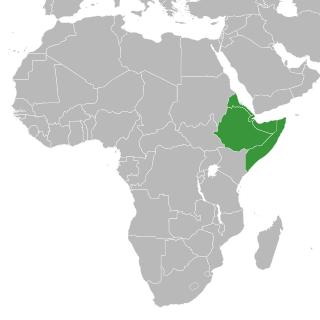 W
WConflicts in the Horn of Africa have been occurring since the 17th century BCE. The Horn of Africa includes the nations of Djibouti, Eritrea, Ethiopia, Somalia and Somaliland.
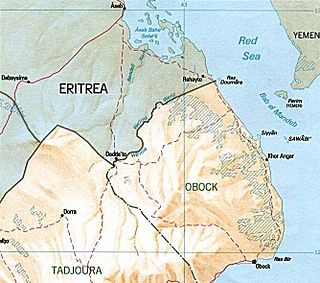 W
WThe Djiboutian–Eritrean border conflict between the forces of Djibouti and Eritrea occurred between June 10 and June 13, 2008. It was triggered by tension which began on April 16, 2008, when Djibouti reported that Eritrean armed forces had penetrated into Djibouti and dug trenches on both sides of the border. The crisis deepened when armed clashes broke out between the two armed forces in the border area on June 10, 2008. During the conflict, France provided logistical, medical and intelligence support to Djibouti, but did not participate in direct combat.
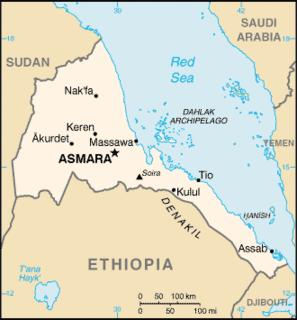 W
WThe Eritrean Civil Wars were two conflicts that were fought between competing organizations for the liberation of Eritrea.
 W
WThe Eritrean War of Independence was a conflict fought between the Ethiopian government and Eritrean separatists from September 1961 to May 1991.
 W
WThe Eritrean–Ethiopian border conflict was a violent standoff and a proxy conflict between Eritrea and Ethiopia. It consisted of a series of incidents along the then-disputed border; including the Eritrean–Ethiopian War of 1998–2000 and the subsequent Second Afar insurgency. The border conflict was a continuation of the Eritrean–Ethiopian War of 1998–2000. It included multiple clashes with numerous casualties, including the Battle of Tsorona in 2016. Ethiopia stated in 2018 that it would cede Badme to Eritrea. This led to the Eritrea–Ethiopia summit on 9 July 2018, where an agreement was signed which demarcated the border and agreed a resumption of diplomatic relations.
 W
WThe Eritrean–Ethiopian War was a conflict that took place between Ethiopia and Eritrea from May 1998 to June 2000, with the final peace only agreed to in 2018, twenty years after the initial confrontation.
 W
WThe First Congo War (1996–1997), also nicknamed Africa's First World War, was a civil war and international military conflict which took place mostly in Zaire, with major spillovers into Sudan and Uganda. The conflict culminated in a foreign invasion that replaced Zairean President Mobutu Sese Seko with the rebel leader Laurent-Désiré Kabila.
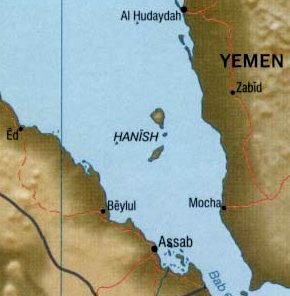 W
WThe Hanish Islands conflict was a dispute between Yemen and Eritrea over the island of Greater Hanish in the Red Sea, one of the largest in the then disputed Zukur-Hanish archipelago. Fighting took place over three days from 15 December to 17 December 1995. In 1998 the Permanent Court of Arbitration determined that most of the archipelago belonged to Yemen.
 W
WThe Second Afar insurgency is an ongoing insurgency in the Afar Region of Ethiopia and the Southern Red Sea Region of Eritrea, waged by various Afar rebel groups. Both Ethiopia and Eritrea have supported different rebel groups in the region in a proxy war, and have occasionally engaged in border skirmishes with each other, as well as with opposing rebel groups.
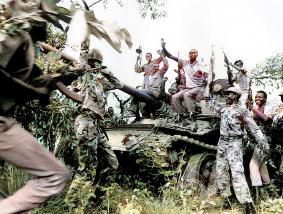 W
WThe Second Sudanese Civil War was a conflict from 1983 to 2005 between the central Sudanese government and the Sudan People's Liberation Army. It was largely a continuation of the First Sudanese Civil War of 1955 to 1972. Although it originated in southern Sudan, the civil war spread to the Nuba mountains and the Blue Nile. It lasted for 22 years and is one of the longest civil wars on record. The war resulted in the independence of South Sudan six years after the war ended.
 W
WThe Somalia War, Ethiopian Invasion Of Somalia, or Ethiopian intervention in Somali Civil War, was an armed conflict involving largely Ethiopian and Somali Transitional Federal Government (TFG) forces and Somali troops from Puntland versus the Somali Islamist umbrella group, the Islamic Court Union (ICU), and other affiliated militias for control of the country. The war officially began shortly before July 20, 2006 when U.S-backed Ethiopian troops invaded Somalia to prop up the TFG in Baidoa. The TFG in Somalia invited Ethiopians to intervene, which became an "unpopular decision". Subsequently, the leader of the ICU, Sheik Hassan Dahir Aweys, had declared that, "Somalia is in a state of war, and all Somalis should take part in this struggle against Ethiopia". On December 24, Ethiopia stated it would actively combat the ICU.